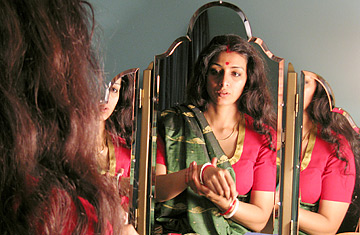
The Namesake.
2007; Director: Mira Nair; Screenplay: Sooni Taraporevala, from the novel by Jhumpa Lahiri
With Irrfan Khan, Tabu, Kal Penn, Zuleikha Robinson, Jacinda Barrett, Sahira Nair
20th Century Fox Home Entertainment
Available Nov. 27, List Price $27.98
Harry Smith, the CBS newsman, once managed to deride two major cities by calling New York "Calcutta without the cows." Mira Nair grew up near Calcutta, has lived half her life in New York, and loves both places, though not blindly. Her new film, from a best-selling novel, distills the immigrant experience into two generations of Indians and Indian-Americans, and two brisk hours of home truths that are no less touching for being cliches. "Land of opportunity," "Anything is possible": to those new to America this isn't political rhetoric. It's the reason they came here, what they hope and perhaps expect.
Calcutta, 1977: Ashok (Khan), a university graduate and survivor of a train wreck, enters into an arranged marriage with Ashima (Tabu), who has been studying music. Straight off they come to live in New York, where their two children are born: a boy (Penn), whom they nickname Gogol, after the author Ashopk was reading on the fateful train, and his sister Sonia (played by the director's niece Sahira). The son, who becomes an architect, rebels against Ashok and Ashima by using the Gogol name, by moving in with a daughter of white privilege (Barrett), by questioning nearly every tradition his starchy parents were raised in. When the upwardly mobile lad is told, "Your parents want you to marry a nice Indian girl," he snaps, "I don't care what they want. This is what I want."
You get no points for guessing that Gogol will climactically realize that being part of this family is more important than making one of his own. That's a staple of Indian films: the primacy of the vertical connection (from generation to generation) over the horizontal (from husband to wife). The tendency is also showing up in American movies like Waitress, where Jenna is above all things a mother, and the new comedy-drama The Savages, in which two middle-aged professionals jettison their lovers to take care of their ailing father and themselves. For a nation of nomads, of people who reject their pasts, indie films offer up the fantasy of a reconciled family.
I don't mean to make a summary judgment on movies about loving your parents or becoming one. Family films can be good ones. The Namesake, mostly, isn't. Hopscotching from one moral platitude to the next, it quickly establishes plot parameters that any alert viewer will find predictable. Over the quarter-century of the story, changing hair styles do much of the acting, and the choice of clothing is meant to cue instant assumptions in the viewer. (Gogol's white girlfriend inanely wears a strapless dress to a funeral ceremony.) It's the kind of movie where a sudden emotional bonding automatically precedes a sudden death; where the sensitive strains of a solo piano or acoustic guitar underlines the finer emotions; where the grudges planted in Act One will be resolved — check them off — in Act Three.
It's no fun making fun of a film put together with such devotion as is evident in The Namesake. On the excellent commentary track, Nair describes her emotional commitment to the story; this could be her autobiography, once removed. She brings such lucidity and eloquence to the enterprise, I wish I could have seen the film through her eyes instead of mine.
What I did see, and what gave me aching pleasure, was some wonderful acting. Khan lovingly captures Ashok's modesty and determination. Penn bears up manfully under the burden of Gogol's coming-of-age and, for fans of his Harold and Kumar, has a moment as a teen dopester. In the role of an Indian girl whose sexual liberation in Paris tests Gogol's attraction for her, Robinson exudes a smart, complex sensuality (until the plot double-crosses her). Many veterans of Bengali cinema illuminate the Calcutta scenes; I wish there'd been more of them.
But for me the shining presence is Tabu, the gorgeous, sensitive star of such Indian films as Chandi Bar and Astitva. She has the gift of expressing thought and emotion simply by radiating them. She gets to Ashima's feeling of alienation in New York, after living there so many years, and a reticence bred through the ages. "You want me to say, I love you,'" she tells her husband, "like the Americans." Ashima comes from an older, subtler, more discreet culture, where a wife's love is conveyed by the care with which she fulfills her obligations. But Tabu's face can't hide the deep emotions that make any declaration of love redundant. The power and purity of her performance are enough to make to say "namaste" to The Namesake.